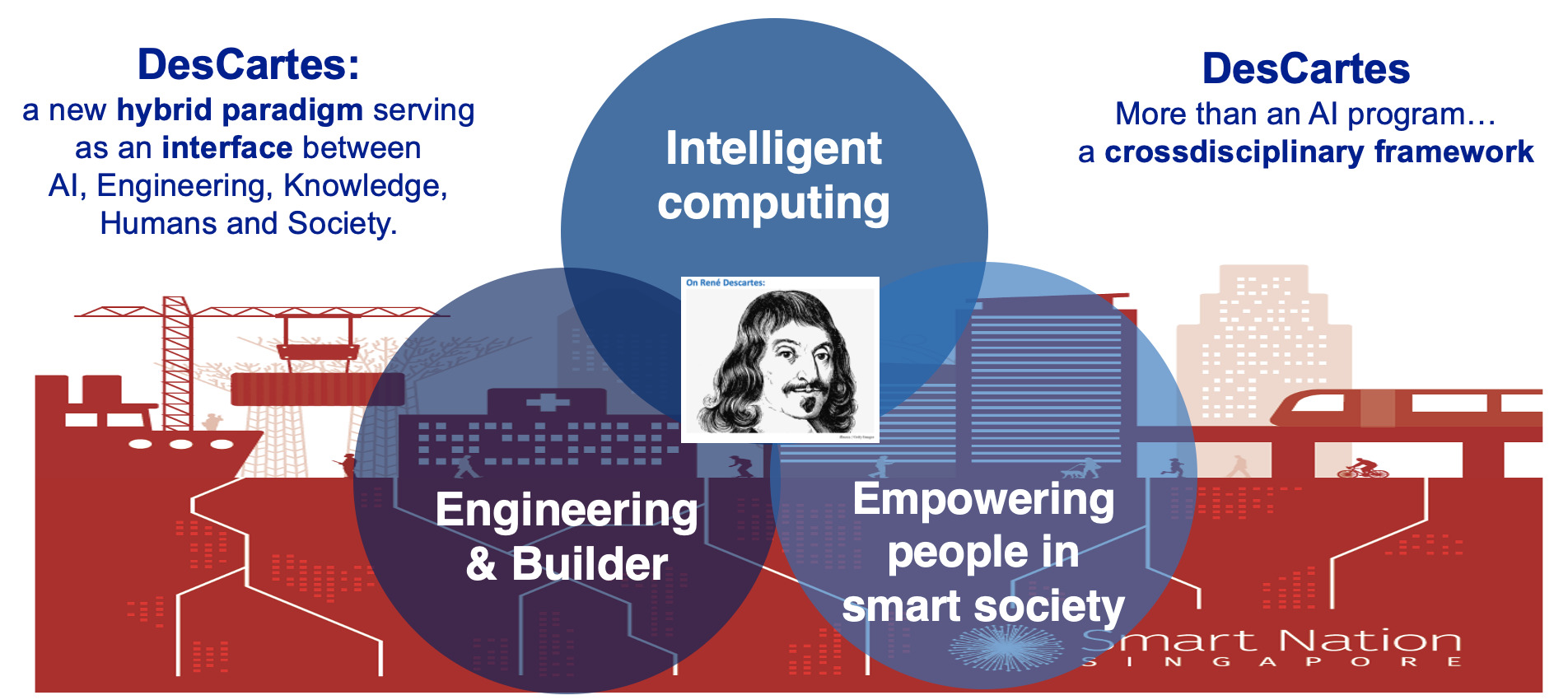DesCartes, flagship project on hybrid AI in urban critical systems in the framework of an international collaboration – The NLP component
 The DesCartes project is a large-scale collaboration in the field of hybrid Artificial Intelligence, starting at the end of 2021. Led by the CNRS subsidiary in Singapore, this project involves the CNRS and 11 universities and Grandes Écoles on the French side, including the University Toulouse 3 – Paul Sabatier (UT3), and five universities and the A*STAR Institute on the Singapore side. 17 researchers and research teachers from Toulouse are involved (UT3, INP, ENAC, CNRS-IRIT, CNRS-LAAS and CNRS-CERCO). Farah BENAMARA, Associate Professor at UT3 and co-leader of the MELODI team, from the Artificial Intelligence department of IRIT, is the scientific leader for UT3 of the Automatic Natural Language Processing (NLP) research domain in this project. With a consolidated budget of 35 million euros over five years, DesCartes is based at the CREATE campus in Singapore, its international research hub.
The DesCartes project is a large-scale collaboration in the field of hybrid Artificial Intelligence, starting at the end of 2021. Led by the CNRS subsidiary in Singapore, this project involves the CNRS and 11 universities and Grandes Écoles on the French side, including the University Toulouse 3 – Paul Sabatier (UT3), and five universities and the A*STAR Institute on the Singapore side. 17 researchers and research teachers from Toulouse are involved (UT3, INP, ENAC, CNRS-IRIT, CNRS-LAAS and CNRS-CERCO). Farah BENAMARA, Associate Professor at UT3 and co-leader of the MELODI team, from the Artificial Intelligence department of IRIT, is the scientific leader for UT3 of the Automatic Natural Language Processing (NLP) research domain in this project. With a consolidated budget of 35 million euros over five years, DesCartes is based at the CREATE campus in Singapore, its international research hub.
Un projet international ambitieux
Starting in January 2020, the DesCartes program’s main objective is decision making in “urban critical systems”, one of the many research challenges related to the “smart city”. The DesCartes project will enable the integration of this theme into the Singapore hub and respond to the needs identified by the city for its smart city policy by 2030. DesCartes also allows to reinforce a French dynamic in Artificial Intelligence, in the spirit of the France AI plan, while four interdisciplinary institutes in artificial intelligence (3IA) have been created. The dynamic of international cooperation that has been fostered will extend the research work undertaken by these laboratories. Artificial intelligence is a major field of research, especially for the CNRS, and the DesCartes project is representative of the importance of this research area, especially in the context of international partnerships. Through the DesCartes project, the two countries have started a strong partnership around AI research, which focuses on four main research areas: data and its applications, verifiable and explainable AI, natural language processing, and interaction between AI and human-computer interaction.
Farah BENAMARA, porteuse de la partie TAL du projet
In the framework of the DesCartes project, Farah BENAMARA leads the research area on Natural Language Processing (NLP), and works more specifically on the analysis of conversations and social networks. NLP is a multidisciplinary research field, at the intersection of linguistics and computer science. Now, TALN also integrates artificial intelligence, more precisely the sub-field of artificial learning. TALN can be said to be essentially about the analysis of languages by means of a computer, in order to model a spoken or written language. TALN is also known by different names, which show nuances within this vast field of research. Among them, one can speak of “linguistic engineering”, when the research focus is on practical and operational aspects; or “computational linguistics”, when linguistics is predominant. TALN also studies text generation processes, i.e. the production and not the automatic analysis of texts. This field of research and application is of growing interest, especially with the appearance of conversational agents and digital tools based on natural language interaction with users. For interaction to occur, there must be both a linguistic analysis stage and an automatic text generation stage. Automatic language processing, applied to the analysis of conversations and social networks, aims to better understand social behaviors and to apprehend certain societal evolutions. The unprecedented volume of textual data available on social networks, the variety of this data and the network of user interactions represent new opportunities for understanding social behavior.
The research in artificial intelligence within the framework of the DesCartes project thus represents both a challenge and an opportunity for new research for IRIT researchers. It confirms the excellence of the work of the teams in this field in the laboratory, and the international recognition of Farah Benamara who will play a key role in this major cooperation on the issue of “smart city”. In addition to Farah BENAMARA, DesCartes will allow a dozen researchers from IRIT to contribute to research within this partnership, to spend time in Singapore, and to co-supervise international doctoral and post-doctoral students through funding opportunities.